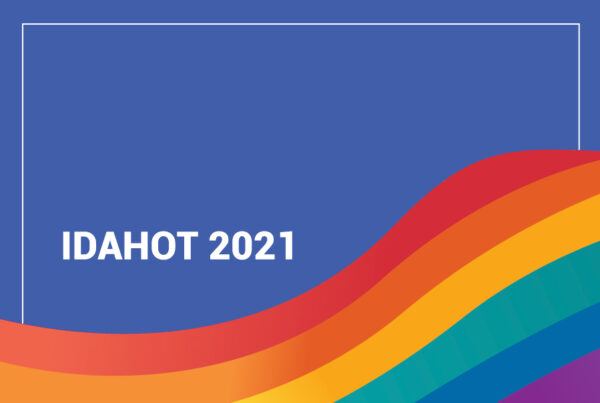The Coronavirus pandemic took the world by surprise. Governments and health experts are rushing to find solutions while pushing for social distancing and lock-down to prevent its spread.
Being under lock-down might not be a major issue to those who happen to be more privileged than others, especially because of socio-economic status, race, gender and sexual identity, accepting environment, and age. Unfortunately, this is not the case for everyone.
LGBTIQ+ organizations around the world are sounding the alarm to shed light on the negative physical and mental health of the pandemic on their communities. They are also working to reduce the harms associated with the lock-down, given that this growing pandemic is likely to compound the vulnerability of many individuals, and lead to various negative health consequences.
Many in the community have already been living with anxiety and depression, as studies reveals that LGBTQI+ are three times more likely to battle those mental health issues, due to several factors like such as internal and external homophobia, and minority stress. Some are living with pre-existing health conditions, like heart disease, cancer or HIV–Research shows that these conditions impact the LGBTQI+ community at a greater rate than their heteronormative counterpart, partly due to a higher level of stress hormone and riskier behaviors caused by stigma, discrimination, and fear, as well as greater tobacco, alcohol, and substance use.
Trans* individuals, especially those who are on hormone therapy within their transition have doctor visits interrupted and often difficulty in accessing general necessary services, which is prevalent due to transphobia in healthcare settings. The situation during this crisis could be aggravated, as hormones might develop several physical and mental side effects, if monitoring by a doctor and access to healthcare is more compromised during lock-down. People living with HIV with detectable viral loads, or those who don’t know that they carry the virus or do not receive the necessary care and treatment; are at a potential higher risk of developing complications following a COVID-19 related as body immunity is considered compromised. The current lockdown and limited access to healthcare or obstructed treatment could likely seriously impact their health condition, treatment disruption is known to lead to microbial resistance. Click here to check the precautions for people living with HIV during the COVID-19 pandemic
Isolation, particularly from the community, will intensify loneliness, an already common experience reported among the LGBTQI+ community, especially among the elders who also live with the anxiety of contracting the coronavirus, as they are at risk of life-threatening complications. Many younger LGBTQI+, used to accessing safe spaces and being with friends, are likely to be trapped at home with homophobic family members, exposed to different forms of violence and hostile conditions related to their gender and/or sexual identities and HIV status.
The World Health Organization recently voiced the importance of protecting our mental health during this phase, which would help us control the negative effects of the lock-down and support our immune system. So here are some of the things you can do:
Limit Social Media & News
With many of us staying at home we are exposed to a lot of news that is circulating through different channels including TV, some is true and others are fake. Much of the information disseminated is stressful, inaccurate, and could cause panic. Setting a specific time of the day to watch/read the news from a trustful source helps us control the anxiety, specifying certain hours where you open social media platforms to control the amount of information that is coming your way.
Set a Schedule
Organizing regular habits or some sort of a routine will tremendously help you spend a better day and feel active. This includes setting time for meals, exercise, work, cooking, cleaning, walking, painting, etc. Confusion in your schedule, however, will lead to boredom which will induce anxiety and depression. If you’re having a difficulty starting up your day, just start with the easiest and most pleasurable things for you, and then the activities you enjoy less will follow smoothly. An easy physical exercise is a good idea to start your day, since it increases blood flow and energy. You can also think about the activities that you always wanted to do but couldn’t because you didn’t have time or the chance to do them, e.g. registering in an online course, learning a new language, watching a certain series, picking up yoga, or reading a certain book.
Disrupt your Schedule If you Need to!
Yes you heard us right, setting up a schedule would help you feel more active, but don’t let that schedule make you feel committed beyond your capacity. If you don’t feel like committing to your schedule, it is fine, and you should use this time to relax. The schedule will help you feel more active, but it should never make you feel pressured or add to your stress. You are in control.
Eat Healthy
A lot of studies have been going on about nutritional psychiatry and they concluded the following: a well-balanced diet isn’t just beneficial for your physical health but also for your mental health and your brain functioning. A diet that is rich in vegetables, fruits, unprocessed grains, fish, and seafood and lower in sugar, processed food, meat, and dairy contribute positively to our mental wellbeing and reduces the risk of depression by 25-35%. Have at least 3 separate meals a day with a couple of snacks, make sure you are taking all the nutrients needed, and do enjoy some of unhealthy cravings but only in moderation. Remember, don’t stress yourself over your diet, and be mindful of throwing away food or overstocking. Not everyone in our community has access to a variety of food or any food at all, reach out to other around you, if you have enough, share with those who don’t have. We are the only ones supporting each other for now.
Exercise Indoor & Outdoor
Exercising doesn’t necessarily mean lifting weights or doing difficult workouts. A few simple exercises like squats, lunges or stretching several times a week would elevate “happy hormones” like endorphins, and give you a feeling of wellbeing. There are lots of online video tutorials on home workouts and stretching that you can follow and learn from for free (e.g: Yoga with Adrienne). At the beginning it might seem a bit difficult to exercise at home but it becomes much easier with time. Also, walk or jog outdoors in the sun (preferably in a natural setting), if you can, while maintaining social distancing, as it decreases anxiety and depression and boosts your immune system. Be mindful of your country’s policies about leaving the house. This may be trickier for those who live in cities and crowded places. Remember the top priority is keeping yourself safe and healthy.
Stay Connected with Others & Support them
It is very important for us as LGBTQI+ to forge solidarity bonds with each other, especially in these times, and to support the most vulnerable among us. Check on your loved ones; call them regularly; talk and listen to them; and don’t limit yourself to such social media interactions as likes and comments on Facebook or Instagram. Creating a support system with each other will help us overcome this phase.
Help Each Other Out
Many of us might be struggling with problems that are even more intensified with the start of this crisis. Some of us have lost employment, are no longer getting paid, can no longer pay rent and have nowhere to go; some of us are already living in severe socioeconomic conditions. Offer to support others with the means possible and available to you. This could be listening to someone and providing emotional labour over the phone, cooking, getting much needed medication, and even financial support — whatever your friends’ needs and your ability. This will not only provide much needed support to the community but it would also give you a sense of purpose and boost your morale.
Enjoy “Safe” Sex!
During this Pandemic, having physical sex is too risky for us and others. Therefore, cyber-sex or sexting and masturbation are safe alternatives for the time being that would also improve our mental-health. It has been proven that masturbation has lots of benefits including stress reduction, tension release, and the increased rate of dopamine, also known as the “pleasure hormone” which is released when you masturbate. Keep in mind, however, that there might be some risks related to privacy and security with sexting and cam sex especially for LGBTQI+, and stay vigilant. Click here to check some safety tips for sexting
Listen to Music or Read a Book
Relaxing, reducing stress, improving your mood, alleviating the symptoms of depression, and enhancing concentration are some of the few benefits associated with listening to music and reading. With the extra free time on our hands, it may be a good time to read a book that you’ve been curious about or journals that may expand your knowledge in your field of expertise to improve your skills. Enjoy listening to any kind of music that you like whether it’s classical, commercial, EDM or oriental. It doesn’t matter! At any time of the day or while you’re exercising, cleaning up your apartment, or doing any other activity, it will boost your motivation right away.
Finally, Just Breathe
Deep Breathing helps us calm down and feel relaxed, for those who can go a step further, they can meditate which also has a lot of benefits for their mental health. Meanwhile, think of the things that you are grateful for in your life, including the simplest things that we take for granted but never thought of how essential they are to our lives. One popular breathing exercise is the 4-7-8 technique which is known to reduce anxiety:
Start with exhaling completely through your mouth then
Inhale though your nose 1 2 3 4 (seconds) – Hold 1 2 3 4 5 6 7 – Exhale through your mouth 1 2 3 4 5 6 7 8
You can also find many more breathing techniques online that serve different purposes.
One important thing to keep in mind, No matter what, don’t obsess yourself with any activity as if it’s an obligation. Everything that was mentioned are meant to ease this phase and help you thoroughly. There will be times when you feel down or depressed and perhaps not in the mood to do anything, that’s completely okay! Don’t put hard to achieve and unrealistic standards, have a set of activities that you would like to do but at the same time be spontaneous and go with the flow. Don’t pressure yourself or feel bad because you weren’t able to complete some of the things that you had in mind, be patient, and eventually you will get there. Step by step, things will become more natural and smooth as you get used to a new lifestyle. And remember “fake it until you make it”.
Lastly, a lot of those negative feelings that you might be experiencing could be affected by social media, specifically, by people posting how they are successfully managing their lives during this phase or in general. Be mindful that a lot of the things that are posted do not reflect the real picture, and even so, don’t fall into the viscous circle of comparing your life to others because it will only make you feel worse–especially that you could never know what’s the real situation of others and what they might be going through. Instead, focus on some of the positive things happening in your life, look out for your recent or previous achievements, including the small ones that you often didn’t pay attention to or give yourself credit for accomplishing them.





